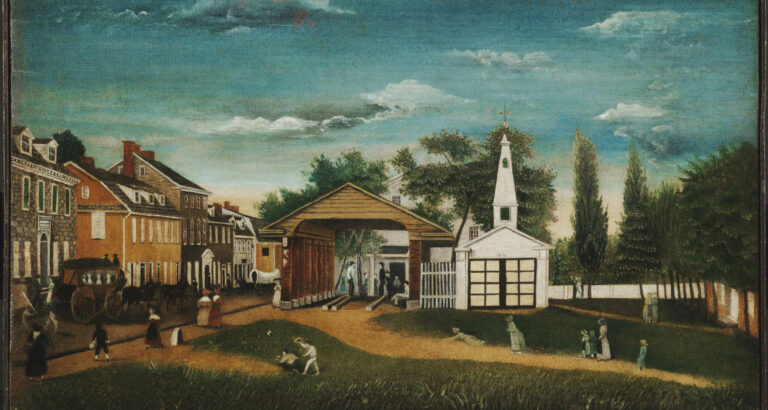(Market Square Germantown, Wiki Commons)
Paine, Rush and Slavery
Hello there. If you are reading this then the chances are that you have come via endnote 21 (cited on p. 370 in the Chatto & Windus UK edition/p. 454 in the Farrar, Straus and Giroux US edition) in the ‘Atlanticus’ chapter of Life, Liberty and the pursuit of Happiness.
I wanted to take the chance to elaborate on a scholarly issue here that space constraints within the notes section of the physical book made difficult to tackle there. The question at hand is the authorship of the article ‘African Slavery in America’, which was printed in the Pennsylvania Journal on 8 March 1775.
In the book I assert that Paine did indeed write this piece. The evidence that he did so comes from Benjamin Rush, someone who was there at the time and knew Paine well. In a letter that was written in 1809, Rush states:
About the year 1773, I met [Paine] accidentally in Mr Aitken’s bookstore, and was introduced to him by Mr Aitken. We conversed a few minutes when I left him. Soon afterwards I read a short essay with which I was much pleased, in one of Bradford’s papers, against the slavery of Africans in our country, and which I was informed was written by Mr Paine. This excited my desire to be better acquainted with him. We met soon afterwards in Mr Aitken’s bookstore, where I did homage to his principles and pen upon the subject of the enslaved Africans. He told me the essay to which I alluded, was the first thing he had ever published in his life. (The Life of Thomas Paine by James Cheetham, pp. 34-5)
Following the evidence laid down in this statement, Victorian-era biographers of Paine like Moncure Conway tracked down what they believed to be the piece in question. It was signed ‘Justice and Humanity’, and it ran in one of the Bradfords’ (William Bradford’s) papers (The Pennsylvania Journal) at around the time that Paine and Rush met in early 1775. From this point onwards ‘African Slavery in America’ has been one of the best known of Paine’s early works. It features, among other places, in the finest study of Paine’s life, John Keane’s Tom Paine: A Political Life, (2009, p. 100); Penguin Classics’ The Thomas Paine Reader; Paine’s entry in the Oxford Dictionary of National Biography; Harvey J Kaye’s Thomas Paine and the Promise of America (2006, p.36) as well as Stephen Fried’s 2018 biography of Benjamin Rush (p. 116).
Attributing unsigned eighteenth-century journalism, however, is no simple business. For anyone wishing to delve into the complexities of this matter I would recommend a wonderful work of scholarly detection – Benjamin Franklin’s Letters to the Press 1758-1775 by Verner W Crane. In that book Crane deals with many of the same dilemmas which confront historians who are attempting to make sense of Paine’s literary output and, more particularly, his slippery first year in Philadelphia. How can we attribute an anonymous piece? What evidence is strong enough? What are the clues that betray the truth? What if an author was deliberately trying to mask their identity?
All these questions hover over the piece ‘African Slavery in America’. It is, after all, somewhat unusual among Paine’s journalism. Never before this moment had he confronted the issue of slavery so publicly. There’s also a noticeable stylistic discordance when compared to his other work, and when Rush’s evidence is examined closely it does have faults. His claim to have met Paine in 1773 is clearly incorrect, as Paine did not arrive in Pennsylvania until the following year. It is equally strange to read Rush’s assertion that the slavery article, ‘was the first thing he had ever published in his life’. This was not the case.
On these ground some scholars have recently argued that Rush’s testimony is invalid and that ‘African Slavery in America’ should be taken out of the Paine canon. For those interested in learning more about this view I would recommend James V. Lynch’s fine article, The Limits of Revolutionary Radicalism: Tom Paine and Slavery (The Pennsylvania Magazine of History and Biography , Jul., 1999, Vol. 123, No. 3 (Jul., 1999), pp. 177-199).
As for myself I do not think that Rush’s evidence can be discounted. Rush was one of the central figures active in Philadelphia during 1775 and he was one of the few who knew Paine well and left testimony about their acquaintance. It seems entirely plausible to me that Rush might remember the circumstances of his early meeting with Paine without being able to remember precisely when it happened. Getting a date wrong and inventing a colourful anecdote are two quite different things.
In this case I have sided with Rush and the traditional view of Paine’s early work in PA, although I do so with the necessary qualification that no one can be absolutely sure one way or the other.
